The Key Role of Wheels in Parrot Cages
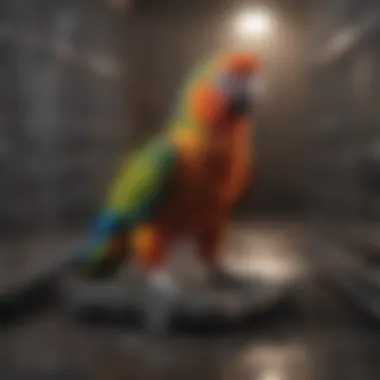
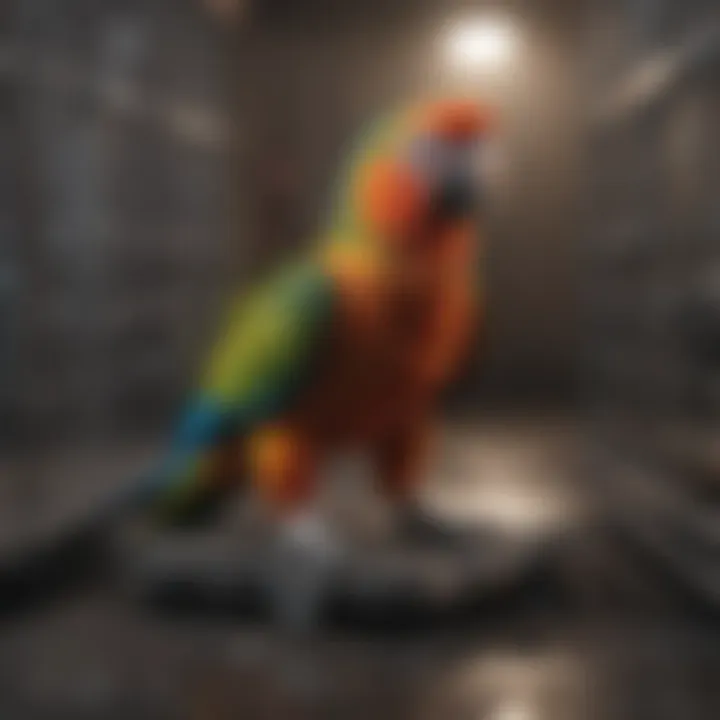
Intro
Wheels in parrot cages often don’t get their due recognition. Yet, these simple additions can mean the world for both birds and their caregivers. Having a cage equipped with wheels makes it easy to shift your feathered friend’s home around, whether you need to clean underneath or simply want to move the cage into a different ambiance. As the saying goes, "a change is as good as a holiday"—the same holds true for our avian companions.
Incorporating wheels serves practical purposes, enhancing mobility dramatically. Let’s take a closer look at how we can improve bird habitats while ensuring their safety and comfort.
Avian Care Basics
Importance of Proper Nutrition
Providing a balanced diet is essential for a parrot's health. Wheel-equipped cages allow for easier access to feeding stations, especially when the cage is moved to different locations for better visibility and sunlight. Birds thrive on a mix of seeds, fresh fruits, and vegetables—just as a balanced wheel facilitates movement. Nutritious options like kale and apples can help ward off many health issues, reminding us that even nature's bounty deserves a good spot on the shelf.
Understanding Bird Species and Their Needs
Different species of parrots have unique habits and preferences. Some may prefer to hang out at the top of their cage, while others might enjoy a cozy corner. Wheels help in optimizing the design of their space. For instance, Australian cockatoos might relax on a swing near the bars, while African Greys appreciate a depth of space beneath them for their toys.
Basics of Birds Habitat Setup
Setting up the right habitat is like arranging furniture for a cozy lounge. When cages have wheels, rearranging for optimal sunlight or reducing drafts becomes less of a chore. Don’t forget essentials like perches, toys, and enrichment items that pique a bird’s curiosity. Keeping it visually interesting can help combat boredom. Just like humans, birds flourish when their spaces are lively.
Grooming and Hygiene Tips
Wheels facilitate easier cleaning by allowing caregivers to move the cage outside for thorough scrub-downs. Regular maintenance is crucial for preventing illnesses and ensuring your parrot's living environment is sanitary. Use safe, bird-friendly cleaning agents to keep the space fresh. Remember, a clean cage promotes a happy bird.
Interacting with Your Pet Bird
Building Trust and Connection
Moving the cage with the bird inside allows it to experience different areas of the home. This exposure can help in building trust and connection. Spend time around the cage, talking to your bird as it observes the activity. Even birds, just like us humans, need a sense of security and routine.
Training Techniques and Tips
Using a mobile setup gives you the flexibility to train beyond the cage. With wheels, you can take your feathered friend to various spots that may stimulate learning. Reinforcing behaviors becomes intriguing when the backdrop changes through spatial movement.
Fun Activities for Bird Owners and Their Birds
With wheels, you can easily integrate fun by moving their cage to common areas where family activities happen, encouraging your parrot to join in. Whether it’s watching a movie or having dinner, interaction fosters bonding—a key to maintaining a parrot's emotional stability.
Recognizing Bird Cues and Behaviors
Wheels also play a role in observing your bird in various circumstances. Different locations may unleash varying behaviors, allowing you to learn more about your pet’s inclinations. Pay attention to signs of comfort, anxiety, or inquisitiveness based on spatial changes.
Emotional Well-Being of Birds
The Role of Play and Socialization
Incorporating wheels in parrot cages can enhance social interaction. Moving the cage closer to family activities enables a sense of belonging for your bird, enhancing its emotional health. Birds are social creatures and their happiness can be nourished through shared experiences.
Enhancing Birds' Emotional Health
Emotional well-being thrives in a thoughtfully arranged cage. With mobility, birds can move to places where they feel safest. They can easily distance themselves if feeling threatened, which aids in stress management. Keep an eye on their behaviors; an anxious bird often seeks solace away from noisy areas.
Assessing Bird Stress and Remedies
When observing stress, a mobile cage arrangement offers you alternatives to create a soothing environment. These changes can lead to a more peaceful and balanced state, echoing how subtle adjustments can influence well-being.
Building Strong Human-Bird Bonds
Ultimately, the bond between you and your parrot is strengthened by various experiences. Wheels simplify the entire interaction process, offering an easy way to adapt to your pet’s needs while creating lasting memories.
Bird Health and Safety
Common Health Issues and Prevention
Having wheels facilitates prompt responses to health concerns by allowing for a swift relocation to your vet. The quicker the action, the better the outcome for your avian friend. Pay attention to signs of illness and be proactive in care.
Routine Veterinary Care
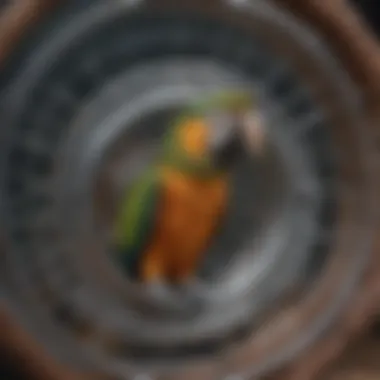
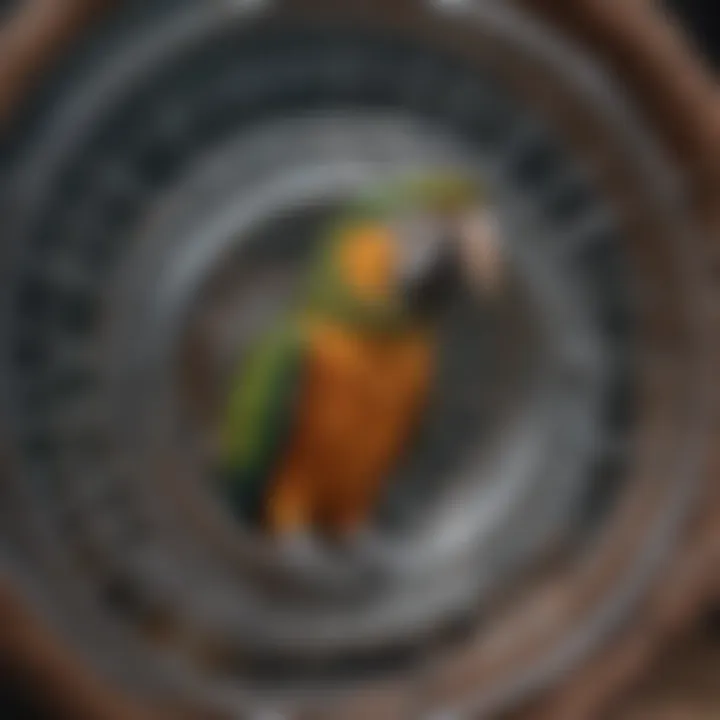
Wheels may also support easier handling during check-ups. As a bird owner, it's vital to build a rapport with an avian veterinarian. Regular visits ensure that your parrot remains healthy and vibrant—a necessity every bird owner should prioritize.
Environmental Hazards to Avoid
Ensure the wheels are secure and the cage, once moved, is stable. It’s important to understand the surroundings; be on the lookout for potential hazards that might come from moving the cage or placing it in different areas.
Signs of Illness or Distress
Pay attention to your bird's behaviors. Lack of movement can indicate health issues, especially if your pet seems reluctant to use its space. Movement, much like the wheels of its cage, is vital for health.
Fun Facts and Quirky Insights
Unique Traits of Popular Bird Species
From their vibrant feathers to their impressive vocal abilities, each species has its quirks. Exploring these traits can be enlightening, just as much as observing how they navigate their mobile home.
Historical and Cultural Significance of Birds
Birds have graced literature and art for ages. Each flutter and chirp mirrors the essence of freedom, capturing hearts—all while providing us companionship.
Famous Bird Owners and Their Stories
Birds have captivated many famous personalities, from artists to writers. These relationships highlight how parrot care is not merely a mundane task; it’s a fulfilling journey that comes with stories and experiences worth sharing.
As we navigate through the intricate world of parrot care, it becomes clear that the wheels in their cages are not just practical accessories. They symbolize a commitment to enhancing the lives of our beloved pets, maximizing mobility, and ensuring their well-being.
Understanding the Role of Mobility
When it comes to creating an optimal habitat for parrots, the role of mobility is often overlooked. However, mobility is not just about moving the cage from one spot to another; it extends to the overall well-being of the birds. Mobility aids in minimizing stress for both birds and their owners, offering a multitude of benefits that directly contribute to the quality of life. As such, mobility plays a crucial part in avian care and emphasizes the importance of incorporating wheels into parrot cages.
The Concept of Mobility in Avian Care
Mobility in avian care revolves around the idea that birds thrive in environments where they can experience change and stimulation. Unlike cats or dogs, parrots are often confined to their cages for much of the day. This can lead to boredom and inactivity, impacting their mental health. Wheels on cages promote an engaging habitat and can easily turn cleaning chores into an efficient process.
Imagine you have a large cage—trying to reach the back corner to clean up can become an arduous task if your cage isn�’t easily accessible. Thus, having wheels allows the owner to reposition the cage with ease. Not only does this convenience save time, but it also encourages proper maintenance, ensuring the habitat remains clean and comfortable. This connection between mobility and care is simple but profound, underscoring how wheels can improve the daily lives of both the owner and the parrot.
Wheels as a Functional Component
Wheels serve as a functional component in avian housing; they’re more than just an accessory—they’re essential for ensuring a fluid and adaptable environment. There are a variety of wheel designs, suits, and functionalities each catering to specific needs. For instance, heavier cages might require larger, sturdier wheels to handle weight and provide stability.
Moreover, many modern bird cages come with locking mechanisms that prevent accidental movement, ensuring safety for your pet while allowing for easy repositioning when needed. In addition to making cleaning more manageable, wheels can enhance visibility for the birds. When cages can be moved to different areas—be it near a window or away from bright sunlight—parrots can enjoy diverse stimuli that keep them engaged and content.
"Wheels in parrot cages are more than just wheels; they are game changers in creating a peaceful living environment for our feathered friends."
In sum, understanding the role of mobility unveils a deeper appreciation for the implications that come with choosing the right cage. It's clear that incorporating wheels is not a mere convenience, but an essential aspect of ensuring that our birds lead healthy, enriched lives.
The Benefits of Wheels in Parrot Cages
When you think about the comfort and happiness of pet birds, wheels in parrot cages might not be the first thing that comes to mind. However, incorporating wheels proves to be an invaluable addition, as they provide multiple benefits that enhance both the living environment of your feathered friends and the daily routines of their owners. In a world where the health and well-being of pets are paramount, understanding the role wheels play makes a significant difference in parrot care.
Facilitating Cage Maintenance
One of the primary advantages of installing wheels on parrot cages is the ease of maintenance it offers. When it comes to cleaning — a task that can often feel as tedious as watching paint dry — having a cage on wheels allows you to move it to a more convenient location effortlessly. Rather than bending and stretching to reach every nook and cranny, a wheeled cage can be rolled out for easier access to all areas.
A clean environment is crucial for the health of your parrot. The accumulation of droppings, food remnants, and dust can lead to potential health issues, not just for the birds but for their owners too. By allowing the cage to be moved out of the way, cleaning it becomes less of a chore. Here are some additional points to consider:
- Quick Spot Cleaning: When you see that your bird has made a mess on the bottom of the cage, having wheels allows for prompt action.
- Thorough Cleaning: Rolling the cage outside or into a different space can make it easier to wash down both the cage and its contents.
- Less Strain on Your Body: Maneuvering a cage on wheels reduces the need for awkward lifting, protecting your back in the long run.
Enhancing Bird Interaction
Birds thrive on interaction, both with their human caretakers and with their surroundings. Wheels can actually enhance these experiences in surprising ways. Imagine setting your parrot in a wheeled cage while you entertain guests or work on projects around the house. You can smoothly roll your bird from one part of the home to another, allowing them to be part of the action. This not only stimulates their curiosity but also fosters socialization.
Moreover, some parrots enjoy the change of scenery, which can lead to a more enriched life. Being able to rotate their cage to face new directions or to place it next to different family members can have meaningful effects on their mood and behavior. Here are a few elements to think about:
- Social Interaction: Moving the cage closer to family activities means your parrot feels included.
- Mental Stimulation: Exposing your bird to different rooms and activities can pique their interest and enrich their environment.
Improving Space Utilization
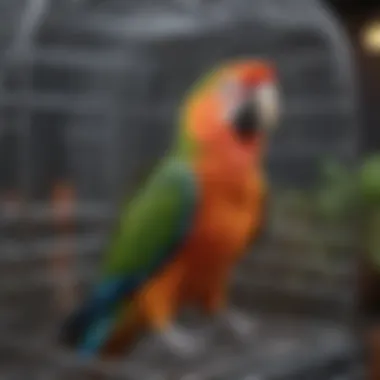
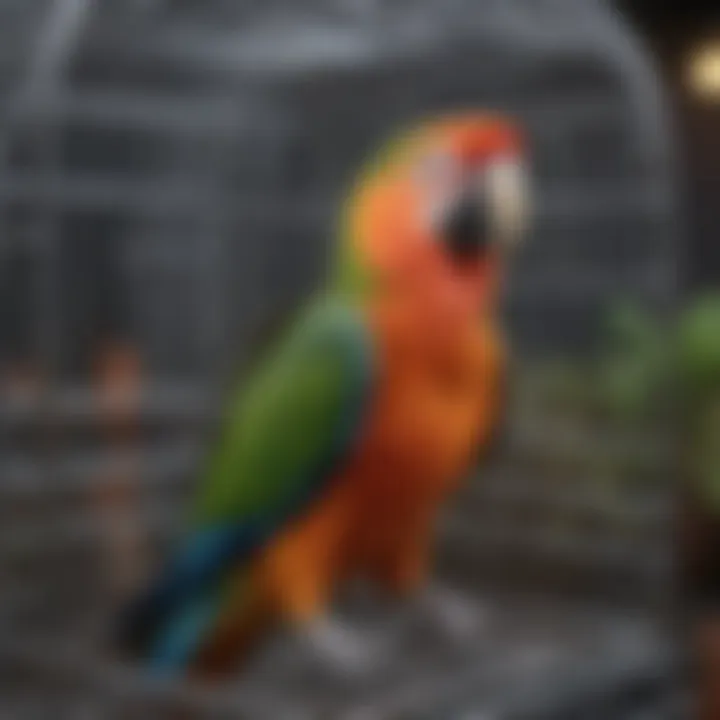
Wheels can also maximize the way you utilize space within your home. For instance, if your living situation is a bit tight, using a wheeled cage means it can be easily relocated without requiring a lot of lifting or adjustments. You might want to move it depending on the time of day or even change the positioning based on sunlight patterns for health and comfort.
Additionally, should you need to free up space for guests or during cleaning, a wheeled cage can simply glide out of the way. It’s about being practical and adaptable, making your living situation more fluid. Here are some critical thoughts:
- Flexibility in Arrangements: Easily adjust the location of the cage without the hassle of a heavy lift.
- Use of Vertical Space: With the cage set up on wheels, you can consider vertical designs that leverage height while staying compact on the floor.
"A simple addition of wheels transforms a cage from a static box into a dynamic part of your home environment."
The advantages of wheels in parrot cages are not merely about convenience; they represent a holistic approach to improving the life of your pet and the vigor of bird care. By understanding these benefits, you're taking significant steps toward fostering a lively, engaging, and health-promoting habitat for your avian companions.
Different Types of Wheels for Parrot Cages
When it comes to parrot cages, the right wheels can make a world of difference. They not only improve mobility but also enhance the overall living quality for your feathered friend. Understanding the varieties of wheels available will help you make informed decisions suited for both your needs and your bird's well-being. Let's dive deeper into the two main categories of wheels: static and mobile, along with custom options that cater to unique designs.
Static Wheels
Static wheels are a straightforward solution that can provide a solid base for a parrot cage. These wheels do not rotate; instead, they serve primarily to lift the cage off the ground, making it easier to clean beneath and around.
- Pros:
- Static wheels often provide excellent stability for larger or heavier cages.
- They can prevent the cage from tipping over, ensuring safety for your bird.
One common concern about static wheels is mobility. If you’re keeping your cage in a spot that needs frequent rearrangement, static wheels may become a bit of a hassle since you’ll need to lift the cage instead of simply rolling it away. Moreover, while cleaning, static wheels facilitate wiping down the surfaces, giving less strain on your back when you sweep around. This style isn't too flashy but can be effective if you're looking for simple solutions.
Mobile Wheels
Mobile wheels, on the other hand, take the concept of mobility up a notch. These wheels make it possible to shift the entire cage with ease. They are a fantastic option for bird owners who often change the cage's location or need to move it for cleaning or social interactions.
- Pros:
- Allows for easy movement, ideal for repositioning and cleaning.
- Many mobile wheels have locking mechanisms which can help prevent unwanted rolling.
Depending on the design, these wheels can add a certain flair to your cage while maintaining functionality. Rolling the cage around how it suits your schedule creates an interactive environment for your bird, allowing it to be part of the household, not just tucked away in a corner. However, when selecting mobile wheels, it's crucial to ensure they are durable and designed specifically for your cage's weight to avoid any mishaps.
Custom Wheels for Unique Designs
For the most adventurous bird owners, custom wheels offer a unique opportunity to tailor functionality. These wheels can be designed to meet the specific needs of your bird, the cage design, or even the aesthetic of your home.
- Customization options:
- Various materials (wood, plastic, or metal) can be used based on durability and ease of mobility.
- Custom sizes can cater to any unique cage shapes or specific flooring needs.
It’s essential to ensure that custom wheels are safe for your pet. So make sure that materials are non-toxic and designs don't pose any risks. In many cases, working with a craftsman can yield stunning, one-of-a-kind results. Not only do these wheels enhance practicality, but they can also serve as a conversation starter in your home.
"Choosing the right wheels can turn your parrot's living space into a versatile and engaging environment, making the wheels an essential part of thoughtful cage design."
In summary, understanding the differences between static, mobile, and custom wheels informs better decision-making for parrot cage owners. This knowledge not only enhances the day-to-day management of avian care but also improves the quality of life for these vibrant pets.
Installation and Maintenance of Wheels
Understanding how to properly install and maintain wheels on parrot cages is critical for ensuring their functionality and the overall well-being of the birds. The mobility afforded by wheels can have a substantial impact not just on the owner's convenience but on the bird's environment as well. In this section, we will discuss the installation process, its significance, and useful maintenance tips for keeping the wheels in top condition.
Installation Process
When installing wheels on a parrot cage, it's not just about sticking them on and calling it a day. This process requires careful consideration to ensure stability and ease of movement. Here’s a step-by-step guide:
- Choose the Right Wheels: First off, it’s vital to select wheels that suit the cage’s design. Consider materials, size, and the capability to lock in place when needed.
- Prepare the Cage: Make sure the cage frame is clean and stable. Inspect for any cracks or weaknesses that could be exacerbated by the added mobility.
- Mark the Placement: Before actual installation, mark where each wheel will be placed. This ensures even distribution and prevents any imbalance that might lead to tipping.
- Install the Wheels: Follow the manufacturer's instructions carefully. Different designs might require specific methods – some could involve screws, while others might need adhesive.
- Check Stability: After installation, push the cage gently to check if the wheels roll smoothly. Make adjustments if necessary. Ensure the cage remains stable during movement.
- Final Cleanup: After everything is in place, tidy up any loose screws or debris to avoid accidents.
"Proper installation of wheels in parrot cages is akin to setting the foundation of a building; without it, the entire structure may falter."
Regular Maintenance Tips
Once the wheels are installed, the work doesn't stop there. Regular upkeep ensures that they remain in good working condition, so your pet can enjoy a safe and pleasant environment. Here are a few handy tips:
- Routine Inspection: Periodically check for wear and tear on movement components. Look for any debris that gets stuck in the wheel mechanisms. It can lead to malfunctioning if left unchecked.
- Clean the Wheels: Dust and dirt tend to build up over time. Keep the wheels clean by wiping them down with a damp cloth to avoid any unnecessary friction. This also helps ensure smooth movement.
- Lubricate When Necessary: Depending on the type of wheels, you might need to apply lubricant occasionally to prevent squeaking and sticking. Use a bird-safe lubricant, ensuring that it won’t affect your pet's health.
- Tighten Loose Screws: Regularly inspect screws and bolts to ensure they’re tightened. Loose components can create instability which might lead to accidents.
- Monitor Weight Capacity: Always be mindful of how the cage is being used. Overloading can lead to excessive wear on the wheels and even create a tipping hazard.
By following these installation and maintenance practices, you can enhance the functionality of your parrot's habitat, making their living space not just easier to manage but also significantly more comfortable for them. Each step you take contributes to their overall well-being, ultimately creating a more enriching environment.
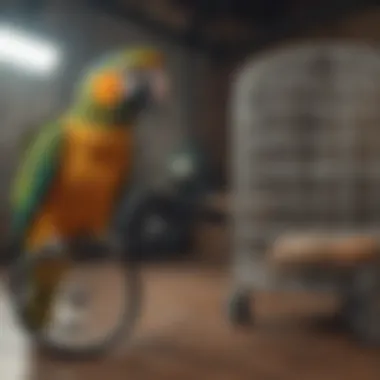
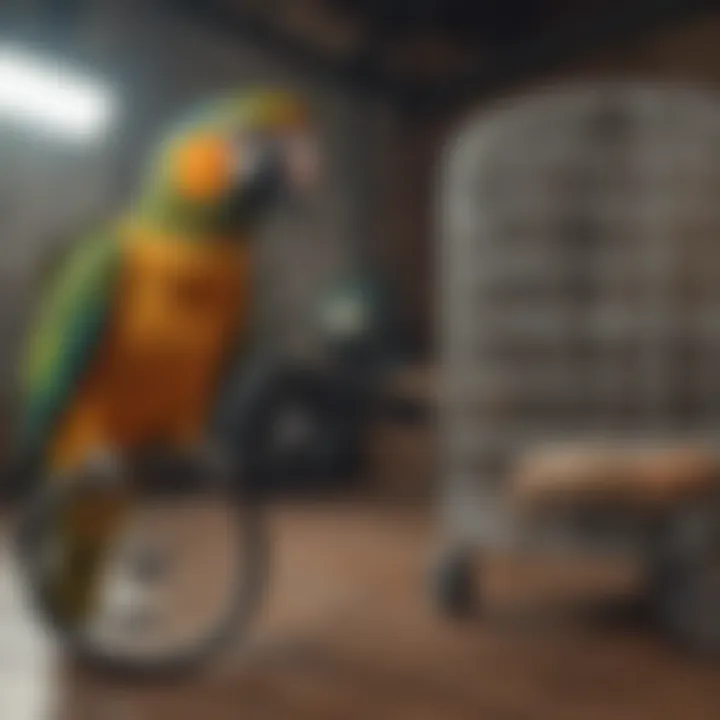
Key Considerations When Choosing Wheels
When embarking on the journey of selecting wheels for parrot cages, there are several crucial elements to consider. The right wheels ensure not only the functionality of the cage but also the safety and happiness of the bird inside. Factors like cage size, the species of the bird, and safety features are paramount. Understanding these considerations can guide the process from chaotic decision-making to a seamless configuration. It simplifies an owner's life while maximizing the welfare for their feathered companions.
Cage Size and Space Factor
Choosing wheels for a parrot cage involves assessing the size of the cage itself. It’s not just about picking wheels that roll well; it’s also crucial to ensure they fit your cage's dimensions. A small, constricted space might benefit from compact wheels, allowing for better maneuverability. On the other hand, larger cages can handle more robust wheels that provide stability and ease of movement.
- Balance: The size of the wheels should match the size of the cage. Too small can lead to instability, while too large might crowd the space.
- Weight Distribution: Heavier cages may require wheels that can bear additional weight without becoming cumbersome or hard to control.
Also consider how the wheels will affect the space inside the cage. If they take up too much room, your parrot might have limited space to flap its wings or play. A well-planned space allows for both mobility of the cage and a comfortable environment for the pet.
Bird Species and Activity Levels
Different species of parrots have varying activity levels, which affects their needs in a cage. Parrots like the African Grey might prefer a more stationary environment, while Cockatoos are often restless and require a cage that can be easily relocated. Each species has its quirks, and understanding these can guide you in choosing the correct wheels.
- Active Birds: For energetic birds, look for wheels that glide smoothly and can support swift changes in direction. It allows for a spontaneous game of catch during cleaning.
- Calmer Birds: If your bird’s more reserved, heavier static wheels may suffice. They provide stability and peace, minimizing the chance of anchors shifting during their quiet times.
Safety Features to Look For
Safety is the cherry on top of the cake when choosing wheels for any parrot cage. Without the right safety features, even the fanciest wheels can become a hazard. Here are a few elements to consider:
- Locking Mechanism: Opt for wheels that come with a locking feature. This ensures that when the cage is stationary, it stays put, preventing accidental rolls that could scare your bird.
- Material Quality: Wheels made from durable, non-toxic materials are essential for long-term use. Ensure they can withstand a bit of chewing without releasing harmful substances.
- Wheel Size and Type: Bigger wheels often mean smoother rides but ensure they aren't too large to run the risk of catching wings or claws.
"In the world of parrot care, safety features shouldn't be an afterthought; they should be baked into every decision you make."
Understanding these key considerations when selecting wheels for parrot cages can greatly enhance the living conditions for your feathered friends. Properly chosen wheels elevate the mobility and safety of the enclosure, allowing for easier maintenance and interaction, not only effectively satisfying your parrot’s needs but giving you peace of mind as an owner.
Case Studies: Wheels in Action
The real-world impact of wheels in parrot cages can be best understood through the experiences of those who live with these delightful creatures. Case studies illuminate not just the theoretical benefits that wheels bring, but practical, everyday enhancements to the lives of both birds and their owners. Whether it's about facilitating room rearrangements or ensuring birds spend time in a stimulating environment, the evidence gathered from the experiences of parrot owners gives a clearer picture of the importance of mobility in avian care.
Success Stories from Parrot Owners
Many parrot owners have shared compelling stories of how wheels transformed their pets' living situations. For instance, Lisa, who cares for a lively Amazon parrot named Max, described how the mobility provided by wheels allowed her to shift Max's cage seamlessly between rooms.
"Before we had wheels on Max's cage, it felt like moving a mountain whenever I wanted to have him in a different space. With the wheels now, I can easily push the cage to the living room or even outside for some fresh air during sunny days," she noted.
Max not only enjoys the change of scenery but also benefits from the varied stimulation an altered environment offers. The ability to change the surroundings enhances his mental health, making him more engaged and less prone to boredom.
In another case, James, an enthusiastic bird breeder, noticed a marked improvement in his birds’ social interactions after he added mobile wheels to his many cages. "Those simple wheels turned out to be a genius idea. Especially large breeds like cockatoos seem to thrive when they can see and interact with each other more often. Moving the cages easily enables them to have a communal experience, which fosters their social behavior," he explained.
Comparative Analysis of Non-Wheeled vs. Wheeled Cages
Highlighting a comparative analysis between non-wheeled and wheeled cages paints a striking picture of the practical advantages wheels provide. In settings without wheels, owners often face challenges like:
- Difficulty in cleaning the areas underneath the cages.
- Struggles when rearranging living spaces or chasing sunlight for the birds.
- Increased risk of stress for birds during maintenance due to their stationary positions.
On the other hand, wheeled cages present clear advantages:
- Accessibility: Owners can easily roll cages for cleaning, maintenance, or providing new lighting conditions without hassle.
- Freedom of Movement: Birds can be positioned in more spacious areas, enhancing their quality of life, especially with an active lifestyle.
- Social Opportunities: As mentioned earlier, wheeled cages facilitate social interactions between birds, which is crucial for their well-being.
But wheels must be chosen carefully, taking into consideration factors such as the type of flooring, wheel size, and safety features to ensure they don't become a hassle rather than a help. Owners are encouraged to consider their unique situations and the specific needs of their birds when making the transition to wheeled designs.
Through these success stories and analytical insights, we can appreciate the significant role that wheels play in enhancing both the functionality of parrot cages and the overall happiness of their feathered inhabitants.
Epilogue
Wheels in parrot cages are not just a functional add-on; they hold transformative potential for both birds and their owners alike. Understanding their importance can make a significant difference in how we care for our feathered friends. Incorporating wheels not only enhances mobility but allows for easier cleaning and rearrangement of the habitat, which can lead to better overall bird health and happiness.
Summarizing the Impact of Wheels
The integration of wheels into parrot cages provides a wealth of benefits, which can be summarized as follows:
- Enhanced Mobility: Wheels facilitate convenient movement of the cage, allowing bird owners to easily relocate it for better light exposure or cleaning.
- Easier Maintenance: With wheels, routine cleaning becomes less of a chore. Owners can effortlessly roll the cage out for sweeping or mopping, making sure the bird's environment is hygienic and inviting.
- Improved Interaction: Moving the cage brings the bird closer to family interaction, aiding in socialization. This could help strengthen the bond between the pet and owner while also providing more varied stimuli for the bird.
- Space Utilization: Cages with wheels can often fit into tighter spots, adjusting to the owner's living space dynamically. This flexibility makes a world of difference especially in smaller homes.
In essence, employing wheels in parrot cages can elevate the very standard of avian care, leading to happier, healthier birds.
Reflecting on Future Trends
As the landscape of pet care evolves, the role of wheels in parrot cages is poised to gain even more significance. Innovations in design and materials are becoming widely available. For instance, quieter and smoother wheel options are emerging, ensuring minimal disruption during movement. Moreover, smart technology could soon be integrated into cage wheels, allowing for automated or remote-controlled mobility. This would cater to busy pet owners, giving them the ability to reposition the cage effortlessly with just a tap on their smartphone.
Furthermore, bird enthusiasts are increasingly interested in custom-made solutions, born from the desire to create environments that reflect their individual tastes and meet their birds' unique needs. As part of this trend, modular cage designs equipped with wheels are on the rise, permitting owners to expand or modify their bird's living space without hassle.
As pet parents grow more aware of the significance of enriching their birds' lives, wheels will undeniably play a critical role in the evolution of parrot cages. This shift in perspective highlights the ongoing journey toward providing our avian companions with space that is as functional as it is enjoyable.















